The choice of shoes has a significant impact on foot health that cannot be overlooked. It is not only about our daily comfort but also an integral part of our overall health. Therefore, understanding the potential impact of shoes on foot health is crucial for each of us.
Comfort and Fit
Shoes that do not fit properly, whether too big or too small, can cause discomfort to the feet. Shoes that are too small can compress the feet, leading to poor blood circulation. Prolonged wear can result in pain, numbness, and even nerve damage. Conversely, shoes that are too large can cause the feet to slide around while walking, increasing the risk of injury.
Support and Stability
Shoes should provide adequate support and stability to protect the feet from harm during walking or exercising. Shoes lacking in support can lead to issues such as collapsed arches and plantar fasciitis.

Material and Breathability
The material of the shoes directly affects their breathability and comfort. Shoes with poor breathability can cause the feet to sweat excessively, and prolonged exposure to a damp environment may lead to fungal infections, such as athlete’s foot (tinea pedis).
Sole Hardness and Thickness
Both an overly hard or too thin sole can have a negative impact on foot health. A hard sole reduces cushioning and may damage the knees, leading to ankle injuries and tendinitis. On the other hand, an excessively thick sole, such as elevator insoles, may alter the walking center of gravity, increasing the risk of injury.
The potential impact of shoes choice on foot health should not be underestimated. Regularly replacing shoes and maintaining foot hygiene by keeping them clean and dry are also important measures for preventing foot problems. If you experience discomfort or symptoms of potential foot issues, you should seek medical help and follow the advice of a healthcare professional.

